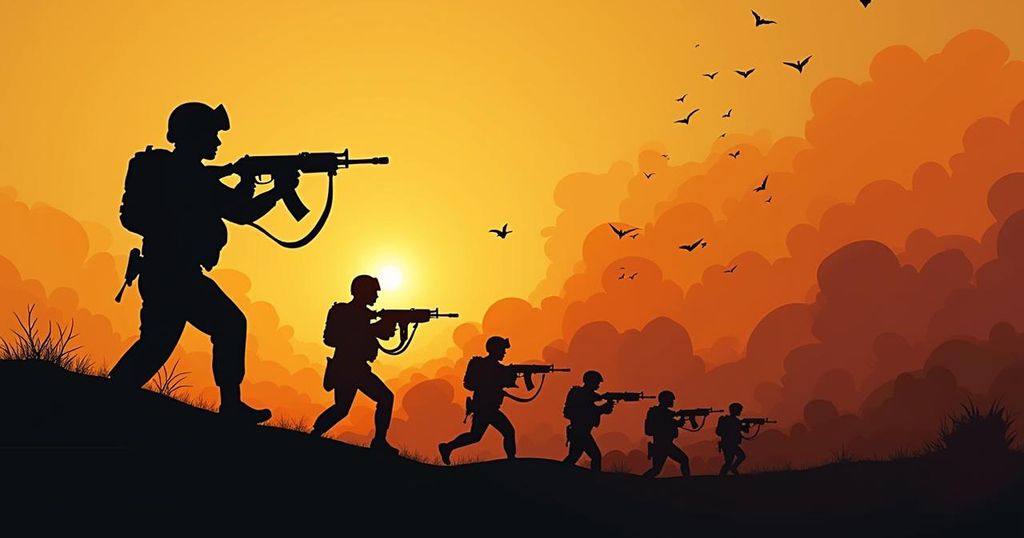The conflict between Hezbollah and Israeli forces in southern Lebanon intensifies, coinciding with Iranian missile attacks on Israel, prompting global calls for diplomatic dialogue and restraint. International leaders express deep concerns over regional stability, while military experts assess the implications of potential Israeli actions against Iranian military capabilities.
Hezbollah has engaged in conflict with Israeli troops in southern Lebanon, coinciding with an increase in Israeli military actions in Gaza. Reports from Israeli media indicate that helicopters have been utilized to transport wounded soldiers from regions affected by Hezbollah’s assaults. Meanwhile, China’s Foreign Ministry has called upon global powers to mitigate the escalating situation in the Middle East amid Iran’s recent launch of 180 missiles targeting Israeli territory. The Ministry urged influential nations to take a constructive approach to prevent further deterioration of the crisis. In a related context, Saudi Arabia’s Economy Minister, Faisal al-Ibrahim, articulated hopes for de-escalation and diplomatic dialogue in light of the ongoing conflict. Experts, such as Andreas Krieg from King’s College London, have assessed that any Israeli military response against Iran is unlikely to successfully impact its nuclear infrastructure, which lies deep underground. Krieg noted that the intensity of Iran’s recent attack surpasses that of previous incidents, suggesting that Israel may have to execute a more severe retaliation, potentially involving incursions into Iranian airspace. Italian Prime Minister Giorgia Meloni announced plans to convene a Group of Seven meeting to address concerns surrounding the conflict, emphasizing her government’s alarm over the escalating threats from Iran and instability within Lebanon. In addition, the Jordanian government has reaffirmed its commitment to safeguarding its territory, announcing that parts of Iranian missiles had fallen within Jordanian borders, leading to minor injuries among three individuals. Officials also confirmed that Jordanian air defense had responded to several incursions into its airspace. Reports further indicate that Israeli forces briefly breached Lebanese territory before retreating, highlighting continued tensions along the Blue Line that demarcates Israeli and Lebanese borders. India has publicly expressed its deep concern regarding the conflict and called for restraint to prevent its expansion into a broader regional confrontation. The Israeli administration has vowed to retaliate decisively against Iran’s ballistic missile strikes. Israeli Foreign Minister Israel Katz has denied entry to UN Secretary-General Antonio Guterres, criticizing him for his failure to categorically condemn Iran’s missile attacks. Katz described Guterres as an anti-Israel figure allegedly supportive of terrorism. Hezbollah’s spokesperson, Mohammad Afif, further stated the ongoing conflict is only the preliminary phase, asserting they are prepared to defend their homeland, which they claim is merely the beginning of broader confrontational actions.
The article addresses the recent escalation of violence in the Middle East, particularly focusing on the conflict between Hezbollah and Israeli military forces in Lebanon. This is occurring alongside significant military actions involving Iran, Israel, and various regional stakeholders. The complexities of the situation involve international diplomatic responses, regional security concerns, and the military capabilities of the opposing forces, leading to heightened tensions throughout the area.
In summary, the article sheds light on the escalating military confrontations between Hezbollah and Israel amidst a backdrop of Iranian missile strikes and global diplomatic efforts aimed at de-escalation. The responses from various governments and military analysts reflect ongoing concerns about regional stability, underscoring the intricate balance of power and the potential for broader conflict.
Original Source: www.aljazeera.com






